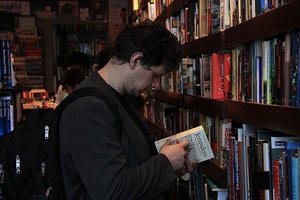Vytas Dekšnys, "According to the definition of Sigitas Geda I am not a poet" 3
In brief: Recently, there was a discussion on Facebook, sparked by Rimvydas Stankevičius thoughts on the impossibility of complete and perfect translation of poetry and the significance of national poetry, which cannot be replaced by any other country's creation. On that occasion, Jurga Tumasonytė is talking to a great poet and translator Vytas Dekšnys about the peculiarities of writers, translations and creative work.
“Poetry is a very difficult material and it can be diverse: translatable and untranslatable. Just like wit - there are inside jokes and universally understood humor (or at least in certain civilization's medium). There exists poetry, were you might break your spine trying to keep a complex form and leave the content and intonations intact and there are free verse narratives, which can be translated as simple prose. I, myself, try not to take up things I am not capable of doing, but it does not mean that others cannot do the things I am incapable of. One can argue about the success or failure of one or another translation, but that is how the dialog is slowly happening with the contexts of other literature. It is important to remain interested,” says the translator.
I wondered if V. Dekšnys could pick out the most difficult translation that he ever had. He says that one of the most difficult works was to translate the biography of Cz. Miłosz. "From smaller books, W. Gombrowicz ‘Cosmos’ wore me out the most. This writer's language is very specific. These are the cases when misery and pleasure accompany each other. However, the most difficult translation is when the author of humanities is no writer and the editors were reluctant to dissect it. My most difficult translation (I will not mention the hackwork I have done for the translation offices) was an article of a Polish historian, written for a Lithuanian publication previously unedited and unpublished.”
Ten years ago V. Dekšnys published a poetry book "Iszimtys", he mentioned, that he has drifted apart form creative work and I was interested in knowing why.
V. Dekšnys says he has all kinds of answers. "I live quietly. My personal life is clear and steady, alcohol is a rear guest that never stays for long. Translation requires a lot of energy. I am not sure if all this is just an excuse. Anyhow, currently I do not really have much to say using these measures. Maybe I lack courage. Poetry is a dangerous game and I am not that brave. Maybe because of this lack of courage to think I also quit philosophy. I did not invest myself that much into creative work as many of the artists, I would always keep some roads to retreat. According to the definition of Geda I am not a poet, because I can stay for a long time without naturally thinking about poetry.”

